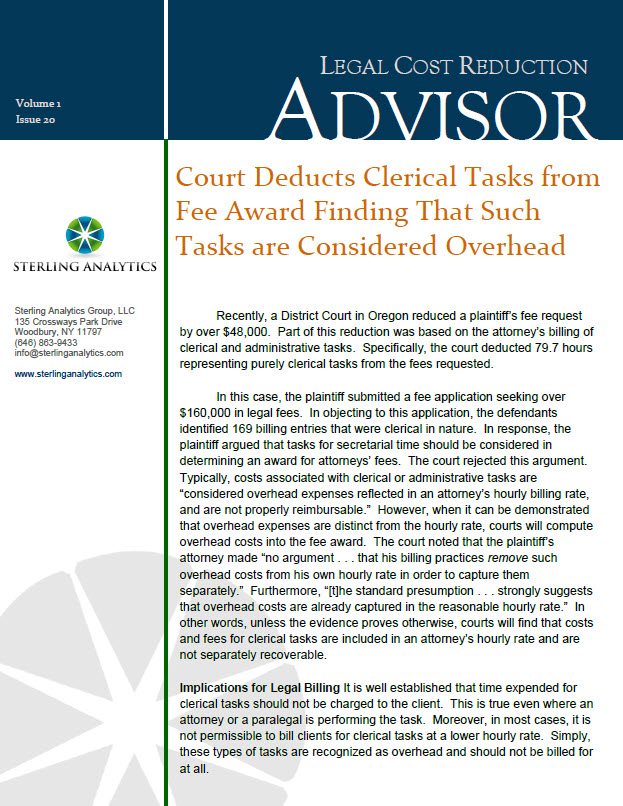Recently, a District Court in Oregon reduced a plaintiff’s fee request by over $48,000. Part of this reduction was based on the attorney’s billing of clerical and administrative tasks. Specifically, the court deducted 79.7 hours representing purely clerical tasks from the fees requested.
In this case, the plaintiff submitted a fee application seeking over $160,000 in legal fees. In objecting to this application, the defendants identified 169 billing entries that were clerical in nature. In response, the plaintiff argued that tasks for secretarial time should be considered in determining an award for attorneys’ fees. The court rejected this argument. Typically, costs associated with clerical or administrative tasks are “considered overhead expenses reflected in an attorney’s hourly billing rate, and are not properly reimbursable.” However, when it can be demonstrated that overhead expenses are distinct from the hourly rate, courts will compute overhead costs into the fee award. The court noted that the plaintiff’s attorney made “no argument . . . that his billing practices remove such overhead costs from his own hourly rate in order to capture them separately.” Furthermore, “[t]he standard presumption . . . strongly suggests that overhead costs are already captured in the reasonable hourly rate.” In other words, unless the evidence proves otherwise, courts will find that costs and fees for clerical tasks are included in an attorney’s hourly rate and are not separately recoverable.
Implications for Legal Billing: It is well established that time expended for clerical tasks should not be charged to the client. This is true even where an attorney or a paralegal is performing the task. Moreover, in most cases, it is not permissible to bill clients for clerical tasks at a lower hourly rate. Simply, these types of tasks are recognized as overhead and should not be billed for at all.
It should be noted that there may be special circumstances where time for clerical or administrative tasks can be billed to a client. For instance, in some law firms, especially smaller ones, it may be customary for an attorney or paralegal to serve legal documents or file legal papers with court clerks. Billing a client for this time will most likely be permitted even though some larger firms would have secretarial staff handle tasks of this nature. However, there are a number of tasks which are universally held to be purely clerical and under no circumstances should the time spent performing these tasks be billed to the client. These types of tasks include, among other things, time for photocopying, scanning, mailing, and office filing. Time spent for these tasks should be contemplated by an attorney when determining his or her hourly rate.
* Orme v. Burlington Coat Factory, 2010 WL 1838740 (D. Or. 2010). Full copies of court decisions may be available through counsel or through various Internet links or paid services.
By Laura R. Bugdin


